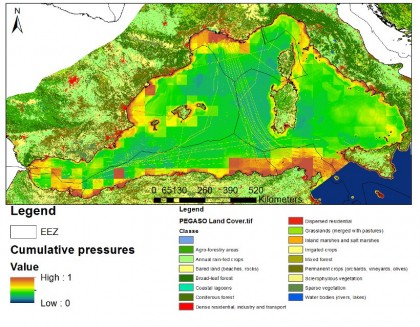
March 2014
 | March 2014 |
Multi-scale tools, methods and models for integrated assessment | |
|---|---|
 A framework for multi-scale ecosystem accounting in the Mediterranean and Black Sea basins has been produced under the PEGASO project. This work consists of three parts, namely Land and Ecosystem Accounts (LEAC), Sea Ecosystem Accounts (SEAC), and the Western Mediterranean Impact Index on Ecosystems (WMIIE). For the first time, these three components have contributed towards a holistic view of the changes in the quality and quantity of stocks and flows in the coastal zone and the pressures that drive them, with full coverage of the two basins at different times for coast and catchments. They have also provided an initial basis for mapping ecosystems, habitats and species, identifying stressors and measuring their cumulative impacts on ecosystems. In particular, a key achievement has been the production of the PEGASO land cover map for coastal zones in the Mediterranean and Black Sea basins relating to changes and trends (such as urbanization, changes in intensive agriculture, dominant landscape types, desertification, land-based impacts, etc.). This work has been supplemented by a preliminary estimate and mapping of natural capital. Another significant result has been the construction of a complementary framework for sea ecosystem accounting using seascape ecology techniques. Two major research projects have been completed: a map of maritime uses and another of ecosystems and species, as well as a matrix and indicators for assessing the health of Posidonia beds at certain sites. Finally a cumulative pressure index has been created for the Western Mediterranean Sea. Scenarios Furthermore, a series of workshops has been held to enable PEGASO partners and end users to discuss and prioritize the major barriers to progress and identify strategies for overcoming them. These activities have provided insights into when and where participatory scenario methods are most useful or most difficult to apply. Further information may be obtained from: Emil Ivanov and Megan Nowell | |